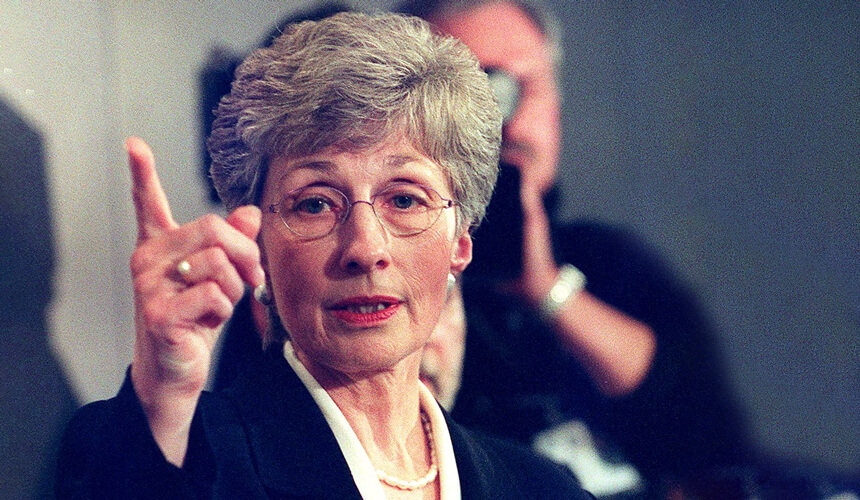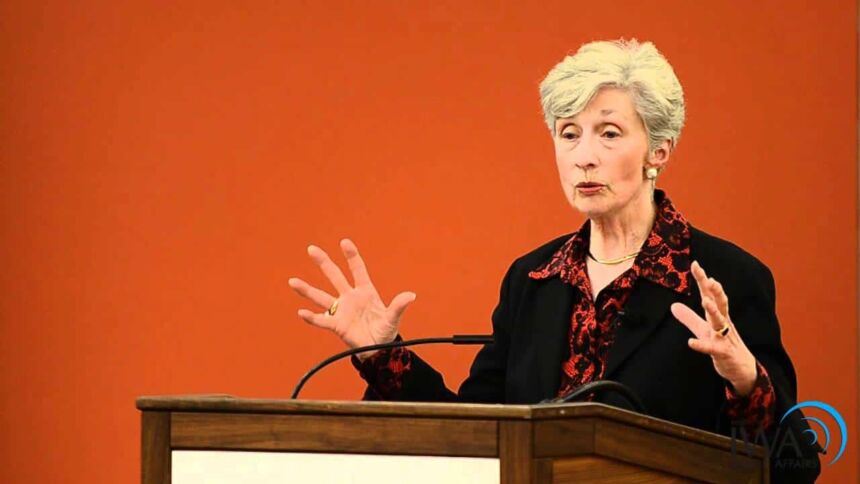Doris Meissner
The Perfect Public Servant
Fred and Bertha Borst were German immigrants to America. Fred arrived via Ellis Island in the 1920s, and told of his heartache when he lost his naturalization papers in a fire. It’s a story his daughter never forgot.
“When your parents are immigrants, you grow up understanding immigration in a way that you never could from a textbook: how precious and difficult it is,” says Doris Borst Meissner BA 1963, MA 1969.
Meissner was commissioner of the Department of Justice’s Immigration and Naturalization Service (INS) from 1993 to 2000. More than 10 million immigrants arrived in America during her service — a high point of immigration in U.S. history.

Doris Meissner testifies as US Immigration Commissioner in Congress March 5, 1997 in Washington, DC. (Image courtesy of Richard Ellis / Alamy Stock Photo.)
Unanimously nominated to the post, she’s credited with major reforms to immigration policy, such as reducing the time to process citizenship requests from 28 to 12 months. In 2000, Meissner made headlines when she ruled that a Cuban shipwreck survivor, the child Elian Gonzalez, should be reunited with his father in Cuba.
Her years of service earned her respect from both Republicans and Democrats. According to then-attorney general Janet Reno: “Doris was everyone’s idea of the perfect public servant.”
Leaving her German-speaking household in Milwaukee for the University of Wisconsin, Meissner studied history and French, was president of Alpha Chi Omega sorority, and was active in student government. After earning her graduate degree in political science and education policy, she was assistant director of the UW’s Office of Student Financial Aid.
She met the late Charles (Chuck) Meissner BS 1964, MS 1967, PhD 1969, during her first year at the UW: her fourth-floor Cole Hall dormitory window faced his in Sullivan Hall. Wedded one day before graduation, they were married for 34 years.
Moving with her family from Madison to Washington, D.C., Meissner became a co-founder and executive director of the National Women’s Political Caucus. She later joined the Justice Department as part of the White House Fellows Program, and she rose to serve as assistant director of the Office of Policy and Planning, deputy associate attorney general, and both acting and executive associate commissioner of the INS.
Meissner left government in 1986 to join what was then the Carnegie Endowment for International Peace, but she returned to federal service when nominated by President Clinton to direct the INS. Today, she directs the U.S. Immigration Policy Program at the Migration Policy Institute, and thought leaders across the nation seek her expertise about the role of immigration in America’s future.
“We have to place the issues in an international context,” she said. “The movement of people is emerging as one of the critical global issues of our age.”
 36° F
36° F
